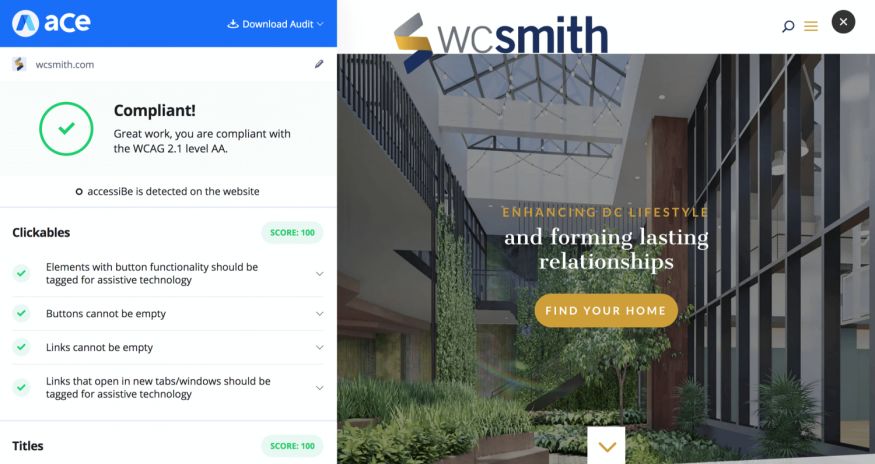
Companies across various industries including small businesses are being targeted by ADA lawsuits. Business groups have raised concern over this. The US Chamber of Commerce expressed that businesses might face a wave of ADA lawsuits after past web accessibility cases received favorable rulings. These fears aren't unfounded. Over 2,200 cases concerning web accessibility were filed in federal courts across the country in 2019.
The real estate industry has raised a similar alarm as various brokers and realtors report having received threats of such lawsuits. Top real estate sites including Zillow, Zumper, Move Inc., and Compass have all been sued for allegedly failing to make their sites usable to visually impaired users.
While the ADA is meant to protect civil rights and promote inclusion, certain unscrupulous parties are exploiting the law for personal gain. Considering how troublesome these lawsuits can be, addressing the root issue and working on web accessibility should be a top priority for industry stakeholders.
ADA Compliance
The internet has been a boon to the real estate industry as it allowed companies and professionals to widen their reach and even digitize and automate tasks such as property listings, applications, and offers. Many brokers and realtors now rely on their websites to serve as digital channels for these activities. Unfortunately, these same channels are what exposes them to ADA lawsuits.
In 2018, real estate broker Compass faced such a suit. The plaintiff, a blind man, claims that he failed to obtain the company's location and operating hours from Compass's website despite using a screen reader. The suit claims that the website did not apply accessibility standards that would allow assistive devices to process the information properly. As a result, the plaintiff was unable to conduct business with the company.
The National Association of Realtors has called the attention of its members to the growing threat from lawsuits exploiting the ADA. A real estate company may suddenly receive an email or letter from a lawyer or firm alleging that its website violates the ADA due to the lack of accessibility features. These parties claim to be willing to settle cases for a fee.
The company is often left with no choice but to engage legal representation to deal with matters, meaning it has to spend on lawyer's fees and associated costs. If found guilty of ADA violations, companies may be fined $55,000 as provided for by the law. Considering the unfavorable business climate that the real estate industry is facing in light of the global pandemic, these lawsuits are bound to become more than a nuisance and possibly even drain companies of their precious time and resources.
While many lawsuits may be considered frivolous, companies should not discount the possibility of legitimate claims. One in four adults in the United States lives with some form of disability. Those looking to file lawsuits may have real bases to file their grievances.
Achieving ADA Compliance and Web Accessibility
The best way to deal with the problem is by eliminating the basis for such lawsuits. Real estate companies should make their websites compliant according to accessibility standards. Ideally, websites should have been designed and developed with accessibility in mind. But these can be done retroactively through remediation efforts.
This conventionally involves doing a comprehensive audit of the entire website by checking each web page element including all interfaces, content, and attachments, if they are properly coded or configured according to the accessibility standards. All noncompliant elements identified in the audit must be subject to remediation. This often includes code changes, redesigns, or introduction of new features.
These tasks, however, can be challenging for companies with websites that already feature plenty of content. Real estate websites, for instance, typically are visually rich. For such pages to be compliant, visuals must be appropriately tagged to allow screen readers to describe these images to the visually impaired. Conventional remediation efforts can be quite costly.
Companies can avail of accessibility platforms and remediation services that make real estate ADA compliance easy.
accessiBe, for example, uses artificial intelligence (AI) to automate remediation, enabling websites to achieve ADA compliance in just 48 hours. The company also recently launched aCe, a free ADA compliance testing tool. Companies just need to input their sites' URL and see if they are compliant within seconds.

Unlike other free checkers, aCe provides both numeric scores and detailed inputs on how the site performs in each area. It checks clickables, titles, menus, and graphics according to standards. aCe users can also opt to download the audit report.
Mobility is expected to be limited at least in the near future. As such, real estate companies should leverage the internet and their digital channels to continue doing businesses virtually. As they maximize the use of their websites, they must also accept the reality that the ADA is law. As responsible businesses, they must ensure that their websites comply with it.
It can be frustrating that it is being used by certain parties for disruption and personal gain. However, it is possible to avoid falling victim to such schemes and all they have to do is comply. Besides, the reason behind the law is to promote equal access and opportunity to everyone.
Rather than viewing ADA compliance as burden, companies can reframe their mindset and consider the wider good that accessibility affords. It would allow people with disabilities to enjoy the conveniences that technology brings. Avoiding troublesome lawsuits would then just be a welcome consequence.
© 2026 Realty Today All rights reserved. Do not reproduce without permission.



